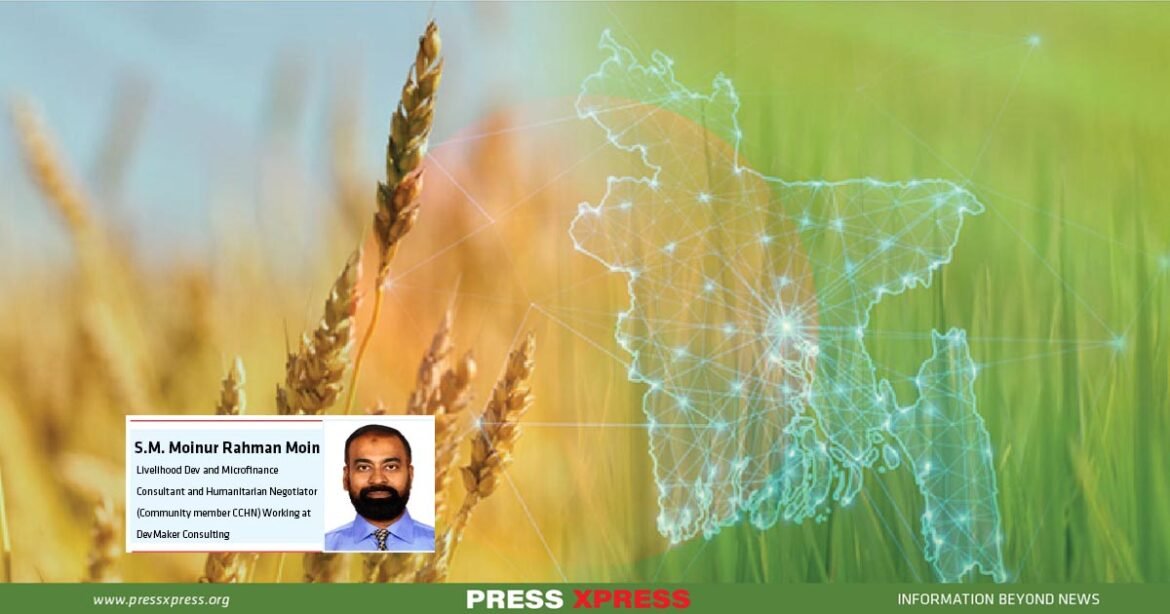In an increasingly digital ecosystem realized by the Government’s “Digital Bangladesh” and “Vision 2041” agenda, information, communication technologies, and digital literacy play a key role as a development index for agricultural value chain actors that can facilitate countries’ capabilities to reach optimum production to meet home demand and increase exports.
On a personal level, it ensures financial, and socio-economical security, which is a form of increased productivity. Added to that, the COVID-19 global health crisis that emerged in early 2020 dramatically underlined – as perhaps nothing else could have – the vital importance of meaningful connectivity to agricultural value chain actors’ livelihoods, employment, health, education, wellbeing, and social participation.
Yet, according to our recent study, among the farmers and agriculture value chain actors; women’s digital access is around 40%, agricultural work engagement through digital tools is largely under-optimized and farmers above 45 years of age with digital tools access is around 30%. One of the biggest obstacles to increased adoption is a lack of knowledge about digital services and, consequently, a lack of the skills necessary to use digital tools, agri-machinery, products, services, and information, especially among smallholder farmers, the elderly, and female groups.
YOU CAN ALSO READ: FOSTERING YOUTH DEVELOPMENT: EMPOWERING THE NEXT GENERATION THROUGH MICRO-CREDIT
Our dependence on digital networks during the pandemic, and the current corresponding rapid growth in the production and delivery of a huge range of new digital agricultural services and mechanization, emphasizes the critical importance of rapidly improving access to digital skills training, particularly for smallholder agricultural farmers. With a focus on expanding prospects for farmers, input sellers, output buyers, and local service providers, offered by digital awareness and literacy while at the same time coping with an ever-adapting digitized economy; Human-centered design (HCD) digital literacy and capacity-building skills are required.
Taking advantage of the opportunity to work in the USAID-DAI Global LLC Digital Frontiers initiative that seeks to increase the ability of agricultural value chain actors in digital literacy, with a particular emphasis on expanding opportunities for farmers, input sellers, output buyers, and local service providers through capacity building training. Our experience says while training is important, it is not as important as awareness. Awareness is a prerequisite for training. Without it, farmers will not be able to see the value of digital agriculture or understand how it can benefit their farm production and businesses.
Contextualizing the facts, we realized farmers first need to be aware of the potential of digital agriculture and its benefits. They must understand how to use digital agriculture services and modern machinery using smartphones. This is where awareness comes in. In this stage, farmers will know about digital devices, benefits, and ease of operation. Undoubtedly training can help farmers learn about the different digital agriculture technologies available, how to use them, and how to interpret the data they generate, and so on.
In regards to this, DevMaker Consulting, subcontracted with USAID- Feed the Future Digital Agricultural activities in Bangladesh project implemented by DAI Global LLC; had organized digital literacy awareness and skill-building training for farmers and agricultural value chain actors at the FTF zone (23 districts) in Bangladesh. Historically, this is the first time in Bangladesh that farmers and agricultural value chain actors have received a blended format awareness and capacity-building training, with both in-person and web-based e-learning modules. A comprehensive HCD literacy module and many other learning tools have been developed. We are overwhelmed to see farmers’ interest in hands-on mobile operation by direct presentation from smartphones.
An exclusive model of breakout sessions for individual and group practice was another era of farmers’ training so far. However, the tools and training materials were designed to help agricultural actors make aware and self-improve their digital skills so that they can use digital technologies in agricultural farming and businesses and also disseminate them to other stakeholders.

DevMaker created a platform to develop current potential knowledge and future scale-up opportunities of digital tools for farmers, input sellers, output buyers, and local service providers through the levitation of awareness and capacity-building training. This activity will assist in developing digital skills to patronize self-sufficient practices whereby agricultural value chain actors hone skill sets to tackle problems themselves through digital assistance.
Using different social media platforms farmers and value chain actors are now connected and sharing their thoughts among themselves. They can acquire agriculture advisory services, weather forecasting, and market information from other stakeholders. The e-learning website (LMS) includes self-paced learning modules and video tutorials-thereby can receive learning at home at their convenient time.
The awareness base digital literacy capacity building training was delivered to 901 farmers and agricultural value chain actors in the FTF zone across 20 districts in Bangladesh. It covered a wide range of topics especially HCD customized for the women and youth farmers and VCAs. The digital literacy awareness and skill-building training is an example of how digital technologies can be used to improve the lives of farmers and agricultural value chain actors in developing countries like Bangladesh.
The training was well-received by the participants and many VCAs expressed that they learned a lot about digital technologies and how to use them to improve their farm and off-farm production and marketing as well as businesses. They also said that the training helped them feel more confident about using digital technologies. Best of luck to our farmers and agriculture value chain actors.


